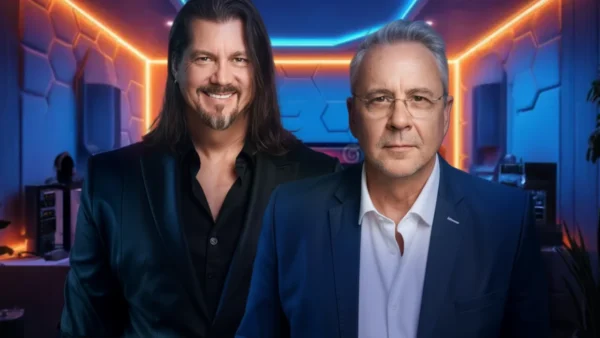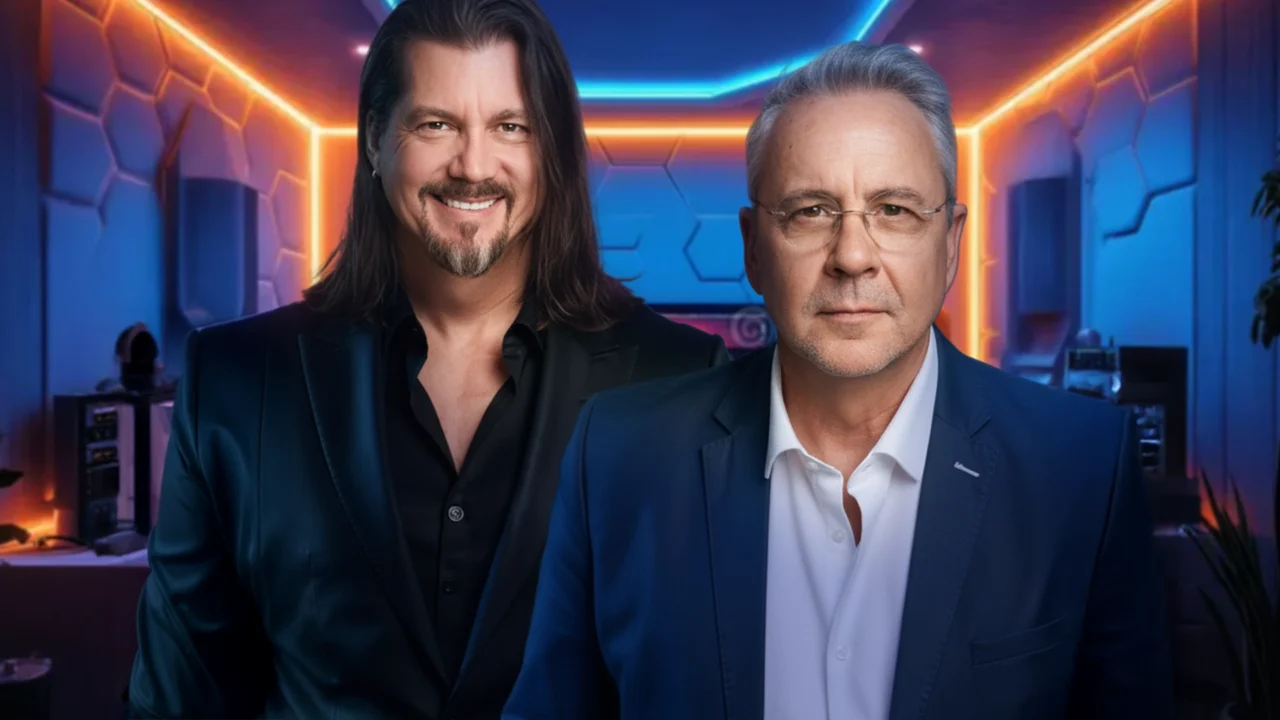Circa 2016: Adrian Hough called me up and said, “Hey, Ric Waugh is a friend of mine and we are both coming to LA to shoot a commercial. He’d like to meet. He has a bone to pick with you!” And meet, we did, in a bar on Sunset Blvd in West Hollywood.
I have lost this video three different times so I’m now making a post so it stays with me until I die…
When Adrian Hough Introduced D.C. Douglas to Richard Waugh
Two Weskers Walk Into a Lab: A Cheerfully Savage Roast of D.C. Douglas and Richard Waugh
There are many ways to make a villain memorable. You can give him sunglasses indoors, a trench coat for all seasons, and a voice that sounds like it learned diction from a scalpel. Or you can take all that and add a performance so gleefully operatic that fans quote it at checkout lines and in dentist chairs. In the sprawling, virus-riddled saga of Resident Evil, Albert Wesker is the aristocrat of antagonists, and two actors defined his English-language sound for millions: Richard Waugh (notably in Resident Evil – Code: Veronica, Resident Evil Zero, and the bonus modes of Resident Evil 4) and D.C. Douglas (notably in Resident Evil: The Umbrella Chronicles, Resident Evil 5, and Resident Evil: The Darkside Chronicles, among others). This is a roast of both gentlemen’s Wesker eras—fond, factual, and wickedly affectionate. If either of them bristles, well, that’s just the Uroboros talking.
If you want the bird’s-eye franchise context, Capcom’s official portal keeps the series canon tidy enough to eat with a fork: Resident Evil Portal.
Wesker’s Wardrobe: Sunglasses, Smirk, and a PhD in Treachery
Before we start carving, let’s set the table. Wesker is the resident corporate vampire—management jargon with a lab coat—whose idea of team-building is dropping you into a facility full of bio-weapons and seeing who files a report. He debuts as S.T.A.R.S. captain and part-time traitor in Resident Evil, then swaggers through the mythos until Resident Evil 5 decides that volcanoes make excellent conflict-resolution tools. Across that arc, two distinct Wesker dialects emerged: “surgical icicle” (Waugh) and “charismatic cobra” (Douglas). Both are correct; both are ridiculous; both are glorious.
Richard Waugh’s Wesker: The Surgeon General of Smug
Signature Appearances
- Resident Evil – Code: Veronica (2000)
- Resident Evil Zero (2002)
- Resident Evil 4 bonus modes (2005)
- Plus lore pieces like Wesker’s Report
Waugh’s Wesker is a masterclass in villain minimalism. You can practically hear him adjusting cufflinks that don’t exist. The vowels arrive lacquered; the consonants snap like cold glass. If diction were a weapon, his mic would require a concealed-carry permit. In Code: Veronica, he marches in like corporate HR arriving to shut down “unregulated heroism.” By Zero, he’s the omnipresent intercom of doom. And in Resident Evil 4’s bonus modes, he’s the extra-credit assignment that wipes the floor with you and then asks to see your thesis outline.
Let’s be honest, though: Waugh’s Wesker sounds like he eats truffles marinated in betrayal and hydrates with room-temperature superiority. Every line suggests he has a second villainy gig after this one and he’s already late. If charisma had a body fat percentage, his is negative. He is the voice equivalent of a razor—sleek, effective, and not to be handled before coffee.
Roast, Served Cold
Waugh’s elegance sometimes crosses into “Did he record this from a leather chaise longue?” territory. There are moments where you expect him to segue into a wine note—“I’m detecting hints of oak, blackberry, and Chris Redfield’s impending humiliation.” When he threatens people, it sounds like a performance review written with obsidian ink. One gets the impression that if he were ever caught in a downpour, the rain would refuse to land.
His superpower isn’t super speed—it’s subtext. You know you’re doomed because he pronounces your name with punctuation you’ve never met. If bureaucracy had a villain form, it would speak like this: perfectly, implacably, and with the faintest apology that you weren’t smarter.
D.C. Douglas’s Wesker: The Champagne Toast at the End of the World
Signature Appearances
- Resident Evil: The Umbrella Chronicles (2007)
- Resident Evil 5 (2009)
- Resident Evil: The Darkside Chronicles (2009)
- Plus ensemble and crossover turns like Marvel vs. Capcom 3 and Ultimate Marvel vs. Capcom 3
Douglas’s Wesker arrives with a different energy: if Waugh is a scalpel, Douglas is a silk garrote—still lethal, but he wants you to enjoy the ambiance. In Umbrella Chronicles, he calibrates the character’s chill; by Resident Evil 5, he throws a cocktail party in a volcano and RSVP’s “global saturation.” This is a Wesker who would monologue, check the lighting, and deliver a second, improved take while dodging a rocket—because standards matter.
His read leans into subtle swagger. The menace rolls off in measured waves; even the taunts feel bespoke. If the line is “Your feeble attempts are futile,” Douglas finds five places to purr and two to sneer without moving the decibel meter. It’s villain ASMR. You don’t fear him at first—you lean in, and that’s the trap.
Roast, Served Hot
Douglas sometimes sounds like he’s auditioning to sell you an elegant doomsday package with free shipping. It’s less “boardroom guillotine” and more “bespoke apocalypse concierge.” In RE5, he’s so unbothered by physics that you suspect friction signed an NDA. His delivery can get so suavely theatrical that even the boulders blush. At peak flourish, he announces the end of humanity like a maître d’ describing tonight’s amuse-bouche: “A delightful reduction of civilization, with notes of hubris.”
Do we buy it? Completely. Is it a little much? Also completely—by design. This is the franchise that weaponized herb mixing; excess isn’t a bug, it’s the feature set.
Two Takes, One Tyrant: Where They Converge (and Collide)
On Authority
Waugh’s authority is clipped and clinical; you obey because your spinal cord writes an apology letter. Douglas’s authority is magnetic; you obey because you’ve been charmed into your own doom. One says “inevitable” in italics; the other says it in calligraphy.
On Humor
Waugh’s humor is a faint shadow on polished marble—there if you squint, and it judges you for squinting. Douglas’s humor is a razor with a smile—he lets the audience in on the joke, right before the joke eats the audience.
On Threat
Waugh sounds like the plan. Douglas sounds like the event. Waugh implies a thousand puppeteered outcomes with a single consonant; Douglas makes the catastrophe sound like an exclusive launch party with excellent hors d’oeuvres.
Performance Craft: Diction vs. Drama
Waugh’s toolset: metronomic control, ice-glaze resonance, and a pace that could balance a glass on your nerves. He accents syllables like a cartographer drawing borders. That’s not “line reading”—it’s territorial acquisition.
Douglas’s toolset: velvet compression, tasteful variances in warmth, and a flair for crescendo that makes even “Hm.” feel like a weapon. He lays the voice like lacquer—thin coats, gleam rising, until suddenly you’re staring at a mirror that looks back.
Both plays are valid. Waugh turns Wesker into a law of nature; Douglas turns him into a destination. Neither interpretation contradicts canon; they decorate it differently.
Iconic Moments, Lovingly Heckled
Waugh in Code: Veronica
He pops out of narrative nowhere to announce that your effort has been audited and found adorable. His lines feel like a cold blade balanced on a teacup—steady, inevitable. If he’d sneezed mid-take, it would’ve sounded aristocratic.
Waugh in Resident Evil Zero
He weaponizes the intercom. It’s not a voice of God; it’s the voice of the God’s legal counsel. Every instruction is equal parts command and contempt. The only thing missing is a hold music loop titled “Your Doom Is Important to Us.”
Douglas in Umbrella Chronicles
This is the calibration phase: the lab-borne cobra studying its terrarium’s edges. You can hear him selecting which syllables will later end civilizations. He’s not at full peacock yet, but the feathers have been notified.
Douglas in Resident Evil 5
Ah yes, the “I have a speech, a syringe, and a schedule” edition. Douglas layers menace like pastry—crisp, buttery, utterly fatal. Even as Chris and Sheva remodel geology with their fists, he never loses that concierge cadence. If volcanology had a dress code, he’s in it.
The Fan Quotient: Why Both Performances Stuck
Waugh gave Wesker his sonic skeleton: sleek, efficient, contempt made musical. Douglas upholstered that skeleton with charisma and turned the sneer into a brand. You don’t get one without the other: Waugh’s precision is the blueprint; Douglas’s flourish is the showroom.
It’s also a matter of timing. Waugh’s defining work arrived as the series scaled its lore—his voice became the cool front moving across the map. Douglas’s tenure peaked as the franchise staged a blockbuster crescendo—his voice became the fireworks at the finale, with extra slow-motion.
Roast Battle: Point-by-Point Petty
Enunciation
Waugh: Could enunciate through a hurricane and correct the hurricane’s grammar. If a syllable misbehaves, he files paperwork.
Douglas: Can purr an entire policy memo and make you thank him for the fine print. His commas flirt; his periods smirk.
Sunglasses Energy
Waugh: Sunglasses that judge your tax bracket.
Douglas: Sunglasses that talk their way past gravity.
Most Roastable Habit
Waugh: Sounds so ethereal that you suspect he communes with a mirror before each threat. He likely ironed the waveform.
Douglas: So luxuriant he could sell a skincare line called “Global Saturation.” Step one: moisturize your enemies.
Lines You Can Hear Without Audio
Waugh: “Do try to keep up.” Translated: you won’t.
Douglas: “I’ll take it from here.” Translated: he already did.
Accuracy Corner (Because Villains Love Receipts)
For those keeping score on the canon specifics: Richard Waugh’s Wesker is widely recognized in Resident Evil – Code: Veronica (and Code: Veronica X), returns in Resident Evil Zero, and shows up again in Resident Evil 4 bonus content. D.C. Douglas’s Wesker leads Resident Evil: The Umbrella Chronicles and then the mainline villainy of Resident Evil 5, with further presence in Resident Evil: The Darkside Chronicles and crossover titles such as Marvel vs. Capcom 3 and Ultimate Marvel vs. Capcom 3. Those are the tentpoles; the extended universe sprinkles him elsewhere like paprika on peril.
Who “Is” Wesker?
Trick question. Wesker is an archetype wearing mirrored lenses: the immaculate traitor, the lab-born demigod, the executive who decided humanity belongs under “Other Expenses.” Waugh carved the marble bust; Douglas taught it to smirk. When fans quote the character, they’re often quoting a hybrid—Waugh’s frost with Douglas’s fizz. That’s not confusion; it’s composite legend.
The Final Taunt (Delivered with Love)
Richard Waugh, your Wesker is so precise that GPS uses it to recalibrate. You could dismiss a hero with a single syllable and send a T-virus back to remedial school. If disdain were a currency, you bailed out Umbrella quarterly.
D.C. Douglas, your Wesker is so smooth that lava asked for his skincare routine. You narrate extinction like a luxury unboxing and make rocket dodging look like ballroom etiquette. If charm were a pathogen, the CDC would name a wing after you.
And to both of you: thank you for making villainy sound like an art gallery with a secret lair in the basement. One of you sharpens the blade; the other gift-wraps it. Together, you gave gamers a voice they love to fear—and to lovingly roast.
Exit Through the Gift Shop
Please collect your complimentary sunglasses, your ethically sourced trench coat, and a commemorative boulder fragment. Do not feed the bio-weapons; they’re on a very strict diet of hubris and monologues.










